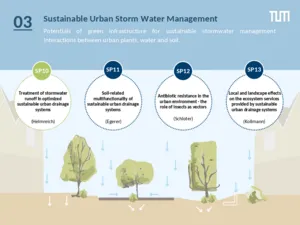Research cluster 3: Sustainable Urban Storm Water Management
Head: Brigitte Helmreich
Urbanization has disrupted or replaced natural hydrological processes due to the regulation of urban watercourses, sealing, and degrading of natural soils. This results in reduced evapotranspiration, less cooling, blocked infiltration, and frequent flooding. Moreover, sealed surfaces in rapidly expanding cities cause biodiversity losses and reduced ESS. They also cause transport and accumulation of pollutants originating from traffic areas, building materials, and industrial processes. Current technical solutions lead the stormwater runoff via the sewer system out of the cities and discharge it into sewage treatment plants or surface waters. However, under climate change, these systems need to be monitored and improved. In addition, these systems are challenged by more frequent and heavier rainstorms as well as extensive droughts.
Sustainable Drainage Systems (SUDS), which manage stormwater on-site, have been suggested as a measure to deal with these issues, and it is known that SUDS can retain, for example, heavy metals. So far, SUDS are designed from a technical and engineering perspective as infiltration systems without fully considering the potential of such systems to become hotspots of biodiversity, thus, generating positive feedback loops for the urban environment including for the mitigation of climate-related issues. Improved systems should take up large amounts of stormwater, deal with pollutants, prevent erosion, be drought-tolerant, and be covered by attractive vegetation with low maintenance costs. However, there is a lack of understanding of the techno-ecological characteristics of SUDS as elements of the UGI that provides multiple functions and ecosystem services. The challenge is to combine expertise in wastewater treatment and urban drainage with microbial ecology, soil science, restoration ecology and vegetation management.
We plan to generate biodiversity hotspots using SUDS in urban environments resulting in multiple ecosystem services provided by these structures. This includes reducing negative health impacts for humans living in urban environments, and in the long-run promoting urban horticulture. These aims require an in-depth understanding, which plants tolerate the specific site conditions at SUDS, including stress caused by extreme redox conditions, biocides, and heavy metals, and how the soil microbiome can support the growth of the target plants.
RC3 will investigate the uptake of urban stormwater run-off and the decontamination of pollutants by enriched sorption materials, the soil microbiome and plants in a three-staged approach. This should result in improved water purification, carbon sequestration, biodiversity, and food and flower production, as well as a more buffered urban climate by increasing evapotranspiration through specifically designed plant mixtures. The cluster will collaborate with Cluster 1 on opportunities of SUDS as multifunctional areas, e.g., for mobility systems.
These objectives are addressed by close interaction of four doctoral projects, which approach the topic from different perspectives. In addition to lab-scale experiments (stage 1 of every subproject), an experimental SUDS at semi-technical scale (stage 2) will be established where all doctoral candidates of RC3 will conduct their experiments in close collaboration, and then jointly review key aspects (water, soil, plants, microbes, micro-climate, pollutants) of the developed systems. For stage 2, we will utilize concrete rings (>20) with 1-m diameter and 1- m height at the TUM Campus Garching. Stage 3 will complete the program through investigations at the technical scale at already existing SUDS in various sites in Munich. Here, a Mercator Fellow (Dr. Deeb) with expertise in urban technosols and SUDS will be brought in to advise SUDS implementation especially in stage 3. Stages 1 and 2 will be established in the first year and monitored in the following years, while in the second year (stage 3) the baseline conditions of existing SUDS will be assessed in terms of biodiversity and ecosystem functioning. Also, new soil treatments and experimental communities will be established and analyzed in the third year, these treatments will also serve as the basis for new studies in the second cohort of doctoral projects the RTG.
The subprojects of research cluster 3 are

PI: Prof. Dr. Brigitte Helmreich
PhD Candidate: Dominik Meier
Dissertation: Treatment of stormwater runoff in optimized sustainable urban drainage systems
Background: A current research challenge is to improve urban soil structure and functionality in sustainable urban drainage systems (SUDS). In the first series of experiments, the adsorption of stormwater pollutants from building runoff (biocides and heavy metals) was investigated in the laboratory with two soil types: high-carbon organic soil (HCA) amendments and nutrients from compost.
Methods: Based on these experiments, we aim to transfer the results into a semi-technical scale with real and synthetic stormwater runoff from buildings. We will use vegetated infiltration swales implemented in outdoor plots at TUM Garching with the soil mixes and plant communities investigated by the first PhD cohort. The focus is now on the removal of pollutants and their immobilization under real conditions like heavy rain events alternating with long droughts. The influent for the experiments will be polluted runoff from biocide-treated facades and metal roofs.
We will determine soil organic carbon, water holding capacity, heavy metal and biocide contents, and the degradation products of biocides in the soil matrix. Additionally, to the semi-technical scale experiments, we will analyze existing SUDS in Munich to test their contaminant content to thereby reduce contaminant risks associated with urban agriculture. We will also compare the remobilization potential and bio-availability of pollutants already bound in SUDS and evaluate whether the improved soil composition could lead to an improvement.
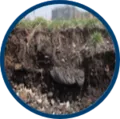
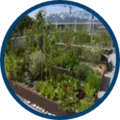
PI: Prof. Dr. Monika Egerer & Prof. Dr .Mohsen Zare
Affiliated researcher: Alexandra Zink
PhD candidate: Samantha Spinoso Sosa
Dissertation: Soil-related multifunctionality of sustainable urban drainage systems
Background: The soil-based ecosystem functions of Sustainable Urban Drainage Systems (SUDS) depend on the soil structure and architecture controlled by the formation and structure of soil aggregates, as well as the plant species composition and the resulting soil-root interactions. A diverse plant community of SUDS can include wetland edge vegetation, such as wildflowers, sedges, rushes, ferns, shrubs and small trees. Below-ground, the plant-root systems influence infiltration through soil channeling to increase soil permeability that enhances stormwater filtering.
Above-ground, these plantings can support urban insect habitat as well as complex insect-plant interactions that underly ecosystem functions, such as pollination, pest control and decomposition. Some wetland plant species may both be key for facilitating water storage but also may be, for example, insect pollinator-friendly through the provision of quality nectar and pollen, though this may be reduced by the uptake of stormwater contaminants.
Methods: This project will combine experimental and empirical approaches to inform the design and planning of multifunctional SUDS that support below- and above-ground ecosystem functions with both knowledge of soil-plant interactions as well as insect-plant interactions. It will study SUDS of various soil and plant combinations and how they affect below- and above-ground functions in different environmental contexts (e.g., along an urbanization gradient under different climatic conditions).
Combining prior experiments that focused on soil structure, high carbon amendments (HCAs) and carbon storage in the laboratory, the PhD student should transfer the results into a semi-technical scale with real and synthetic stormwater runoff from buildings in vegetated infiltration swales implemented in outdoor plots at TUM Garching.
The objectives of the PhD are:
Investigate the role of different soil compositions and wetland plant communities on soil-root interactions to improve soil structure for water infiltration.
Assess the ability of wetland plant communities to attract insects and increase insect abundance and functional group richness.
Analyze the potential of SUDS to dually improve infiltration and insect habitat to inform the implementation of systems in different city contexts.
Examine the status quo of SUDS in Munich from an ecological perspective and propose where experimental SUDS could be implemented within the City of Munich.
We will also collaborate with vegetation scientists, engineers, soil scientists, ecotoxicologists and microbiologists.
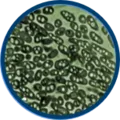
PI: Prof. Dr. Michael Schloter
Affiliated researchers: Dr. Stefanie Schulz, Safiya Yakubu
PhD candidate: Michelle Kligman
Dissertation: Antibiotic resistance in the urban environment - the role of insects as vectors
Background: Insects are essential for maintaining the balance and functioning of ecosystems. They contribute to various ecological processes, such as pollination, seed dispersal, and nutrient cycling, which are crucial for the health and resilience of natural habitats. Additionally, insects play a crucial role in maintaining biodiversity by occupying specific niches within ecosystems and participating in complex food webs. Their presence ensures the stability and sustainability of ecosystems, making them vital for conserving natural environments.
With increasing efforts to promote biodiversity in urban environments and the subsequent implementation of plants at different scales (from facades to parks), cities also become attractive more and more attractive for insects. Furthermore, as a result of climate change, there are strong indications for the invasion of new species, which so far were mainly described for warmer regions to cities in temperate areas. From the biodiversity perspective, this effect is highly desirable for promoting ecosystem services and resilience. From the human health perspective, this implementation of insects might be more problematic, as they may act as vectors for new zoonotic diseases in the future, and the contact with the urban human population might be closer than in rural areas, which strongly promotes the spread of such diseases. In addition, because of their lifestyle and co-selection, insects might harbor a large number of microbes that are resistant to antibiotics, which can, on the one hand, hinder the treatment of patients with new zoonotic diseases and, on the other hand, promote the spread of antibiotic resistance genes in urban environments.
Methods: This project will analyze the microbiome of selected insect species that are typical for the urban environment of Munich. We collect insects of various species and describe their microbiome both assessing structural and functional aspects, with a strong focus on antimicrobial resistance genes. We will focus on in sustainable urban drainage systems (SUDS), as here new hotspots for biodiversity should be created, resulting both an increase in abundance and diversity of insects. To assess the impact of different levels of urbanization, we will sample SUDS along a gradient from downtown Munich to its suburbs.
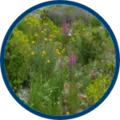
PI: Prof. Dr. Johannes Kollmann
Affiliated researcher: Dr. Markus Bauer
PhD Candidate: Max Thiele
Dissertation: Local and landscape effects on the ecosystem services provided by sustainable urban drainage systems
Background: Sustainable Urban Drainage Systems (SUDS) are effective elements of urban green infrastructure (UGI) within the overall strategy of sponge cities. They deliver multiple ecosystem services, including mitigation of flooding and drought, improved microclimate, reduced pollution, carbon capture, support of pollinators and pest antagonists, and recreational values.
Many technical and ecological aspects of SUDS are well understood, while there are knowledge gaps with respect to ecologically informed design and planning of such UGIs. Planning must evaluate and integrate the multiple functions of SUDS, and this challenge has been rarely addressed so far.
Moreover, planning must acknowledge that the ecological value of SUDS is controlled by local and landscape factors, since the significance the individual functions may vary depending on the immediate neighborhood, the urban landscape and the placement within the urban–rural gradient.
